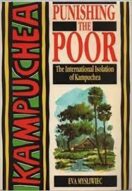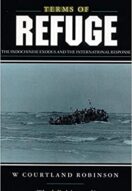Other Resources
The Comprehensive Plan of Action for Indochinese Refugees, 1989–1997, has been hailed as a model of international solidarity and burden-sharing and criticized as an example of international buck-passing and questionable compromises. Looking back on this agreement—one in which both Sergio Vieira de Mello and Arthur Helton played significant roles—a fair conclusion might be that it was both. Though flawed in its implementation, however, the CPA does serve as a model of how inter-locking commitments—to asylum, resettlement and repatriation—can promote regional cooperation in response to protracted refugee crises. Considering their roles in the CPA, though they operated from different institutional vantage-points, both de Mello and Helton showed an ability to combine humanitarian principles with political pragmatism.
Punishing the Poor: The International Isolation of Kampuchea by Eva Mysliwiec
Available at amazon.com
Terms of Refuge: The Indochinese Exodus and the International Response. By
For half a century (ever since the Japanese invasion of 1942), much of Southeast Asia has been racked by war. In the last 20 years alone, some three million people fled their homes in Vietnam, Laos and Cambodia. This book is their story. It is also the story of the international community's response. Spearheading this was the United Nations agency responsible, UNHCR. It pioneered innovations like the Orderly Departure Programme, anti-piracy and rescue-at-sea efforts, and later on, ambitious reintegration projects for returnees. Today the camps in Southeast Asia are closed. Half a million people have returned home. Over two million have started new lives in the United States, Canada, Australia and France.
Available at amazon.com
Floating villages spread across the surface of the Mekong River's waterways, playing host to ethnic Vietnamese whose status in Cambodian society is perpetually adrift.
In 1979, the Skyluck carried 2,700 refugees fleeing Vietnam into the Hong Kong harbour, where they were forced to remain on board for more than four months. Andrew Nguyen and his family were among them. Forty years later, his mother's journals reveal their story.

Based in Santa Clara, VHM collects and shares the testimonies and artifacts that tell the stories of the Vietnamese refugees.

Since 1994, the award-winning Cambodian Genocide Program (founded by Ben Kiernan), a project of the Genocide Studies Program at Yale University’s MacMillan Center for International and Area Studies, has been studying these events to learn as much as possible about the tragedy, and to help determine who was responsible for the crimes of the Pol Pot regime. In Phnom Penh in 1996, for instance, the program obtained access to the 100,000-page archive of that defunct regime’s security police, the Santebal.
From 1975 to 1979, Canadian politicians and diplomats observed and discussed the possibility that a genocide was taking place in Cambodia. The situation was difficult to ascertain, however, given the limited history between the two countries and the deep isolation in which the Khmer Rouge regime operated after rising to power, as well as the Canadian government’s limited interest in international human rights until the late 1970s. It wasn’t until large numbers of refugees began to cross into Thailand in 1977–78, and began to tell their stories to Western diplomats, that human rights discussions at the United Nations began to focus more closely on the situation in Cambodia. Exploring the Canadian government’s use of refugee testimonies, this article explores the relationship between narratives of mass violence and the burgeoning human rights agenda of the late 1970s to highlight the role of refugees in shaping an international human rights agenda.
Read the full article here.
By Huynh, Kinh-Luyên
The purpose of this research is to make a comparative study of Canadian and U.S. policies to assist Vietnamese and Indochinese refugees (also known as Boat People) fleeing the rise of communist regimes in Southeast Asia after the end of the Vietnam War. To explain these efforts, the changes in immigration and refugee policies in the decades leading up to the Indochinese refugee crisis will be explored. Then, the 1975-1981 U.S. and Canadian Boat People policies and their impacts will be presented as this is when the crisis is at its peak and compared to draw conclusions. Research done through various books, media and archives will provide the information needed to draw conclusions from this research.
Read the fulll Master Thesis here (in French).



